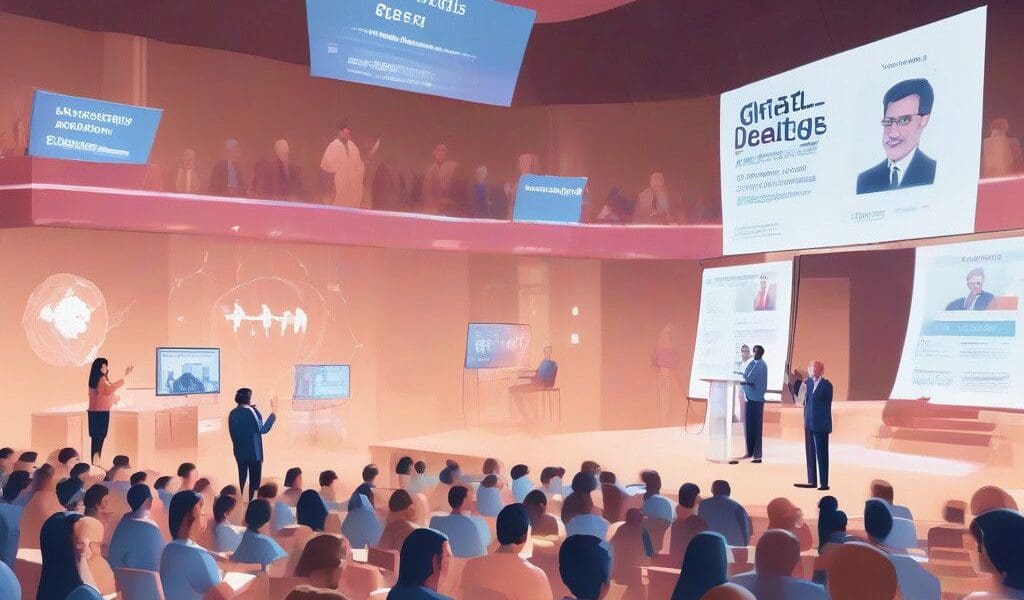Independent Candidate Uses AI to Ignite Political Debate
In the evolving landscape of U.S. politics, innovative strategies are vital for candidates seeking to make an impact. In Virginia’s 8th congressional district, independent challenger Bentley Hensel has adopted a unique approach aimed at reigniting a debate with incumbent Democrat Don Beyer. Hensel’s tactic, involving the use of an AI chatbot named ‘DonBot,’ has sparked discussions around the intersection of technology and electoral politics and raised questions about ethical implications in campaigning.
The motivation behind Hensel’s unconventional strategy stems from Beyer’s refusal to engage in further debates following his decisive victory in the 2022 elections. Disappointed with Beyer’s stance, Hensel decided to create an AI chatbot capable of mimicking the incumbent’s public positions. Built utilizing OpenAI’s advanced technology, DonBot processes and generates responses based on information sourced from Beyer’s official platforms. This innovative approach sets the stage for a debate scheduled for October 17, where Hensel along with another independent candidate, David Kennedy, will face off against DonBot. The Republican candidate, Jerry Torres, may join the discussion if he responds in time.
Beyer’s team has publicly declared he will not attend the upcoming debate, citing participation in a previous forum as sufficient. His spokesperson pointed out Beyer’s commitment to regulating AI to combat election misinformation. However, they refrained from commenting on the legalities surrounding Hensel’s usage of AI tactics. Legal experts suggest that Beyer has limited options to contest the debate, particularly if Hensel clearly marks the AI as an artificial entity and ensures that its use does not cross into commercial territory.
Hensel’s campaign has reportedly raised approximately $17,000, a stark contrast to Beyer’s impressive $1.5 million war chest. This disparity highlights Hensel’s awareness of his underdog status and his belief that innovative approaches such as utilizing AI could elevate his visibility in an uneven race. He has expressed the intention of using the debate not just to argue policy differences but also to demonstrate AI’s potential for enhancing transparency in political discourse.
The implications of incorporating AI into political debates extend beyond the immediate campaign. As artificial intelligence continues to permeate various aspects of life, its role in politics and elections is increasingly scrutinized. On one hand, AI can serve to democratize the conversation, offering platforms for underrepresented voices. On the other hand, the use of AI risks blurring the lines between genuine political discourse and digital facsimiles.
Transparency remains a critical issue. Hensel’s effort to spark debate emphasizes the need for voters to understand the nuances of AI’s use in politics. Clear identification of AI-generated content is essential to maintain trust and integrity within the electoral process. The ethical considerations surrounding AI-driven campaigns should not be dismissed; for instance, questions arise regarding the representation of candidates’ views through a digital avatar and the potential for misinformation to proliferate.
Furthermore, the use of AI in political settings could lead to broader conversations about how technology influences voter perception and political engagement. Candidates leveraging AI might alter the dynamics of traditional campaigning, making it imperative for stakeholders—including voters, political opponents, and regulatory bodies—to engage in ongoing dialogues about best practices for AI utilization.
Ultimately, while Hensel’s strategy is unconventional, it underscores a burgeoning trend in modern politics—candidates and campaigns increasingly turning to AI to facilitate engagement and convey messages. Whether this approach will result in tangible success for Hensel remains uncertain, but it certainly places a spotlight on the evolving relationship between technology and governance.
As we move closer to the debate on October 17, it will be crucial to observe not only the immediate effects on Hensel’s campaign but also the broader implications for electoral politics in the age of AI. The intersection of technology and political engagement will undoubtedly continue to shape election strategies and influence voter interaction in unpredictable ways.








